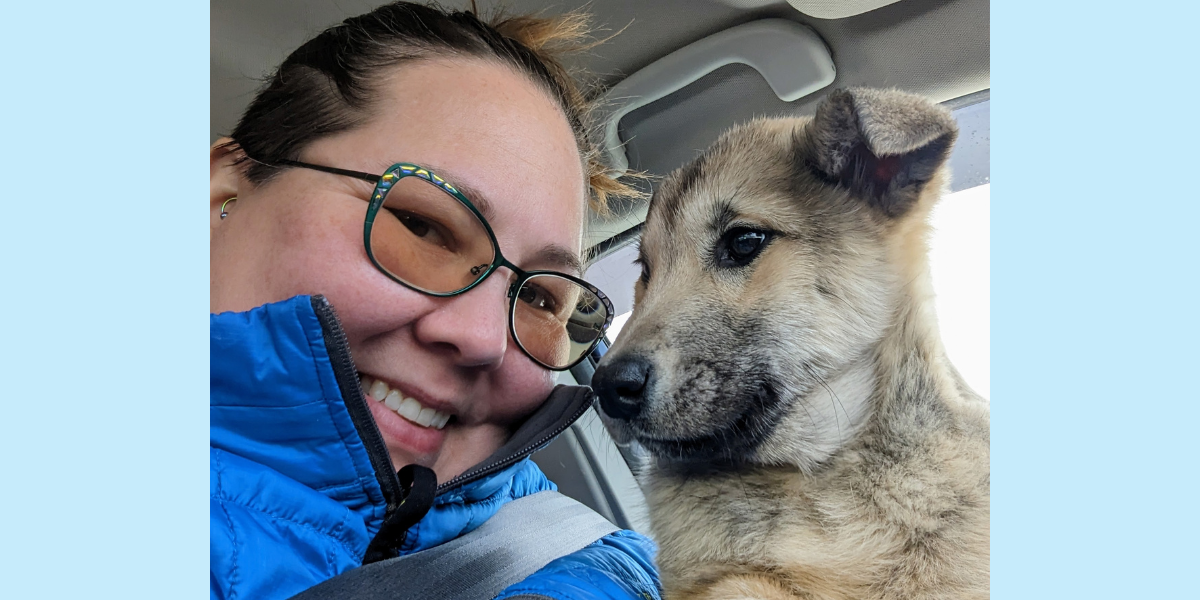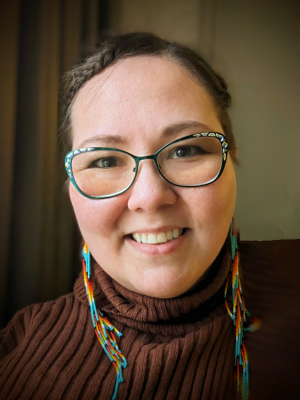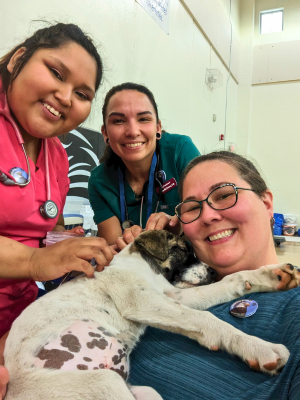A rising star
Raye Taylor, ’11 DVM, brings compassionate, community-focused approach to care and teaching

Raye Taylor, ’11 DVM, brings compassionate, community-focused approach to care and teaching
Dr. Raye Taylor holds a puppy.
Many people consider animals part of their family, but for Dr. Raye Taylor, ’11 DVM, that concept runs deep in her culture and guides her work as a veterinarian.
Whether she’s caring for patients, teaching veterinary students, or working with communities, she embodies values celebrated in Red Lake Nation and other sovereign tribal nations—the understanding that all living beings, humans, animals, and plants are our relatives.
“That is how you take care of your animals,” Taylor says. “You take care of the animals as family and they take care of you.”

The impact of Taylor’s care and expertise has grown significantly since 2011, when she performed her veterinary clinical rotations at the College of Veterinary Medicine (CVM) to complete her DVM degree from St. George’s University in Grenada. At a rather quick clip, Taylor has stepped into several professional roles. An appointee of Gov. Tim Walz and Lt. Gov. Peggy Flanagan, she currently serves as vice president of the Minnesota State Board of Veterinary Medicine.
She provides compassionate veterinary end-of-life care for families saying goodbye to their pets at Blue Skies Pet. Taylor also instructs CVM students in the classroom and in the community through the student organizations Student Initiative for Reservation Veterinary Services (SIRVS) and Veterinary Treatment Outreach for Urban Community Health (VeTouch).
Recently, Taylor landed her dream job with Companions and Animals for Reform and Equity (CARE) as a senior veterinary medical officer focusing on rural communities. CARE’s mission aligns with Taylor’s strengths. Founded in 2020, the non-profit is America’s first national animal welfare organization led by and for Black, Indigenous, and People of Color (BIPOC).
Reimagining animal welfare and protection to encompass the well-being of humans, the group’s priorities include increasing access to care and prevention, pet behavioral training, pet resources, lost and found pets, and involuntary surrender prevention.
As a Red Lake Nation descendant, Taylor values the opportunity CARE provides for her to partner with sovereign nations. Through this collaboration, Taylor empowers stakeholders to develop creative animal welfare solutions that make sense for that community.
CARE gives her flexibility to support each community by meeting their unique needs—she may facilitate grant writing, help them navigate the steps to establish 501(c)(3) tax-exempt status, or train members of the community during vaccination clinics. For Taylor, the opportunity to help these communities is bigger than performing a job—it’s part of her culture.
“If you have, you give,” she says. “If you are gifted—whatever gift, a skill set or knowledge and capacity—it is not yours to own, it is yours to share.”
At the heart of Taylor’s work is fostering strategic planning to guide local communities in establishing their own model and approach to animal welfare. Developing a veterinary learning platform that supports their model and is centered around racial equity, diversity, and inclusivity is one way Taylor serves her people and others like them—minorities and marginalized communities.
Created in partnership with community members and made available free of charge to ensure access, the veterinary learning platform she helps to create informed future approaches to addressing animal welfare in a way that matches the community’s needs.
“Seven generations behind you have prepared you for your actions now and you must choose your actions carefully because your actions too have a ripple that affects the next seven generations,” Taylor says. “By honoring this interconnectedness and these relationships and conscientiously choosing how to use resources, money, food, ideas, energy—animals benefit from that and humans benefit from that. Actions should be mutually beneficial and with the understanding that marginalization hurts the animals and people.”
Taylor’s work with CARE extends to her academic role at the CVM. She feels that those entering the veterinary profession need cultural competency in addition to the technical skills mastered in veterinary school. A core part of the curriculum must include soft skills and communication that centers on DEI awareness and cultural awareness and understanding.

CARE has a pulse on marginalized communities to create training and Taylor shares that in her teaching for the benefit of the students. Her goal is for them to start their careers with eyes wide open and to practice with better cultural understanding from the beginning without having to undo additional biases.
Crediting colleges of veterinary medicine and veterinary organizations for the earnest strides made to date to meaningfully diversify the animal healthcare workforce, Taylor also feels changes feel too small and too slow.
“Real change will require disruption from within,” she explains, “not just to cause a ruckus, but to empower with new tools and new approaches with better reach.”
Taylor feels that the profession is full of compassionate, well-meaning, bright, and beautiful people who, one by one, must be the change. Her work with CARE, in the CVM classroom, and with student organizations SIRVS and VeTOUCH creates the ripples that will bring change.
Taylor will deliver the keynote speech at the CVM-hosted 2024 Iverson Bell Midwest Regional Diversity Summit taking place May 21-23, 2024. The conference theme, “From Scared to Sacred,” provides an opportunity to hear directly from Taylor about her vision for change.